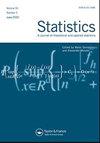鞅差分序列下样本分位数的Berry-Esseen定理
IF 1.2
4区 数学
Q2 STATISTICS & PROBABILITY
引用次数: 0
摘要
在适当的条件下,我们建立了基于鞅差分序列的样本分位数的一致渐近正态性。利用Bernstein型不等式等经典方法,得到了的正态逼近率。最后,我们验证了鞅差分序列的固定分位数的渐近正态性,并给出了一些数值模拟来证明理论结果的有限样本性能。本文章由计算机程序翻译,如有差异,请以英文原文为准。
A Berry–Esseen theorem for sample quantiles under martingale difference sequences
In this paper, we establish the uniformly asymptotic normality for sample quantiles based on martingale difference sequences under some suitable conditions. We obtain the rate of normality approximation of by using some classical methods such as Bernstein type inequality, and so on. Finally, we verify asymptotic normality for the fixed quantile of the martingale difference sequences and present some numerical simulations to demonstrate the finite sample performances of the theoretical results.
求助全文
通过发布文献求助,成功后即可免费获取论文全文。
去求助
来源期刊

Statistics
数学-统计学与概率论
CiteScore
1.00
自引率
0.00%
发文量
59
审稿时长
12 months
期刊介绍:
Statistics publishes papers developing and analysing new methods for any active field of statistics, motivated by real-life problems. Papers submitted for consideration should provide interesting and novel contributions to statistical theory and its applications with rigorous mathematical results and proofs. Moreover, numerical simulations and application to real data sets can improve the quality of papers, and should be included where appropriate. Statistics does not publish papers which represent mere application of existing procedures to case studies, and papers are required to contain methodological or theoretical innovation. Topics of interest include, for example, nonparametric statistics, time series, analysis of topological or functional data. Furthermore the journal also welcomes submissions in the field of theoretical econometrics and its links to mathematical statistics.
 求助内容:
求助内容: 应助结果提醒方式:
应助结果提醒方式:


